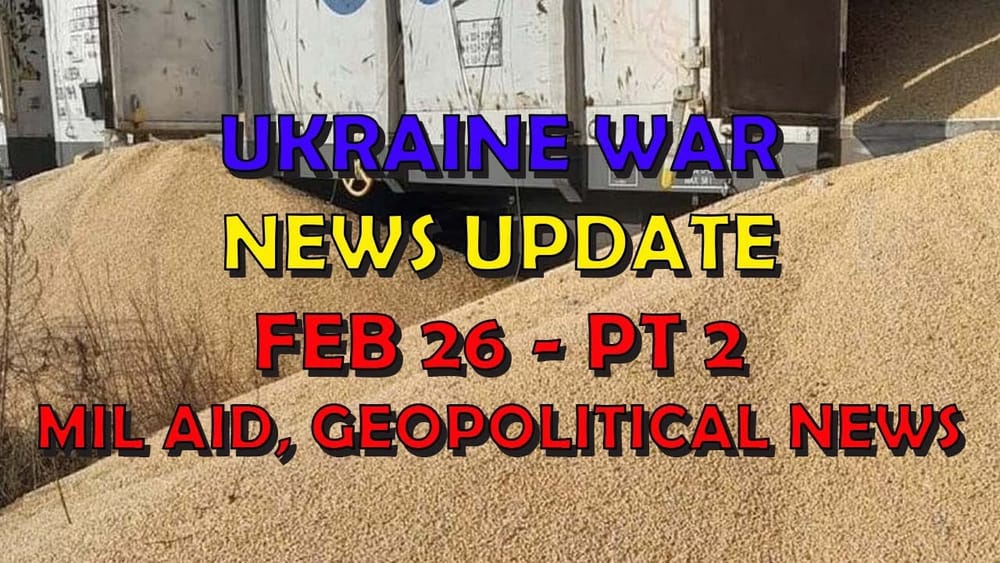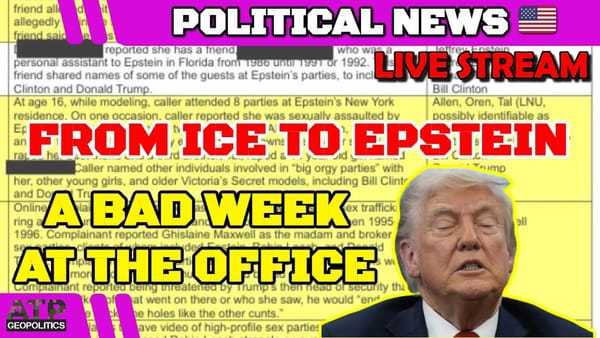Ukraine War Update NEWS: Military Aid & Geopolitical News
Table of Contents 📖
"Europe is paying now over double [what the US has paid] in government support to Ukraine."
Hello Team
🎦 00:00-00:17⏩
Jonathan welcomes viewers to the second part of his Ukraine War News Update for February 26th, 2024. He begins with the Military Aid and Equipment section, focusing on artillery ammunition.
Return to top⤴️
Artillery Ammunition: Bulgaria, Netherlands, Denmark, Canada
🎦 00:17-01:25⏩
- Bulgaria will send 120,000 rounds of Soviet-era 122mm artillery ammunition to Ukraine.
- Denmark, the Netherlands, and Canada are collaborating to finance 800,000 rounds of 155mm and 122mm ammunition, likely from Czechia.
- Jonathan speculates that the 120,000 rounds from Bulgaria are in addition to the Czechian supply.
- Spiegel reports that Germany is in confidential talks with India, via intermediaries, to purchase several hundred thousand artillery shells for Ukraine.
- The German intelligence services estimate that Ukraine's shell reserves could be depleted by June or earlier.
Ukrainian Foreign Minister: Suspend Ammunition Exports
🎦 02:05-02:26⏩
- Ukrainian Foreign Minister Dmytro Kuleba calls for a suspension of ammunition exports from Europe to countries other than Ukraine, emphasizing the urgent need for ammunition.
- Jonathan agrees with Kuleba's assessment, noting that Ukraine's plea highlights the severity of the situation.
US Funding Impasse and Its Global Impact
🎦 02:57-03:41⏩
, 05:48-11:17⏩
, 13:16-14:25⏩
- White House National Security Advisor Jake Sullivan stresses the need for the US Congress to approve additional funding for Ukraine.
- Jonathan expresses frustration with the impasse in Congress, emphasizing the human cost of delays.
- He criticizes US Senator J.D. Vance's claim that $60 billion in aid wouldn't significantly alter the battlefield, arguing that Vance misunderstands the situation's reality.
- Jonathan argues that the US funding delay has global implications, damaging US credibility and undermining its alliance network, particularly in the Indo-Pacific.
- He criticizes the narrative that Europe isn't contributing enough, citing data from the Kiel Institute for the World Economy showing that European aid, as a percentage of GDP, surpasses that of the US.
- Jonathan highlights Justin Bronk's analysis, which argues that European production, though increasing, can't quickly match the scale of US military industrial capacity.
- Jonathan highlights the danger of "overshoot" – the lag time between policy decisions and their effects on the battlefield – and the risk of irreversible consequences while waiting for aid to arrive.
- He emphasizes the catastrophic implications of a Ukrainian defeat, including millions of refugees, a strengthened and emboldened Russia, and a severely weakened Western alliance.
- Jonathan points out the flawed logic in calls for a negotiated settlement with Russia, arguing that Russia's terms amount to surrender and are incompatible with Ukraine's long-term security.
- He reiterates that Russia is not seeking a meaningful ceasefire but rather Ukraine's capitulation.
- Jonathan criticizes those who prioritize the US's rivalry with China over supporting Ukraine, arguing that undermining Ukraine weakens the US's global standing and emboldens its adversaries.
Zelensky's Response to US Funding Delays
🎦 03:41-05:48⏩
- In an interview with CNN's Caitlin Collins, President Zelensky responds to Senator Vance's comments, stating that Vance lacks understanding of the situation and urging him to visit Ukraine and witness the reality firsthand.
- Jonathan agrees with Zelensky's response.
- Jonathan expresses hope that President Biden's upcoming meeting with congressional leaders, including Speaker Mike Johnson, will lead to progress in unlocking aid.
Justin Bronk on Ukrainian Materiel Pinch Points
🎦 06:06-06:27⏩
- Jonathan shifts to a video by Perun featuring Professor Justin Bronk, an aviation expert from the Royal United Services Institute (RUSI).
- He highlights Bronk's insights into the critical shortages facing Ukrainian forces.
Kiel Institute Data: European Aid Outpacing US
🎦 21:01-29:30⏩
- Jonathan discusses the latest data from the Kiel Institute's Ukraine Support Tracker.
- The data demonstrates that total European aid to Ukraine, including financial and humanitarian assistance, has surpassed US contributions.
- The data reveals that, as a percentage of GDP, several European nations, including Estonia, Denmark, Lithuania, and Norway, have committed far more than the US.
- Jonathan emphasizes that while the EU has pledged substantial aid, the actual allocation and delivery of that aid is lagging behind, particularly in military equipment, due to the need to ramp up production.
- In contrast, most of the US's pledged assistance has been delivered. However, Jonathan notes that the US hasn't made a significant new pledge in several months.
- Jonathan highlights that the Kiel Institute's tracker has been updated to include data through January 15th, 2024.
- He points out that EU institutions, separate from individual EU member state contributions, have now provided more financial assistance to Ukraine than the US government.
- Jonathan acknowledges that the EU, as an institution, is not in a position to provide direct military aid from its own stockpiles. He notes that this responsibility falls on individual member states.
- Examining government support for Ukraine (as opposed to just military aid) and factoring in refugee costs, Germany emerges as a leading contributor. Germany's support, including refugee-related expenses, amounts to 1.1% of its GDP.
- The UK, by comparison, has contributed 0.5% of its GDP, and the US has contributed only 0.3%.
- Jonathan emphasizes that these figures demonstrate that the common narrative of Europe not "paying its fair share" is inaccurate.
- He acknowledges the difficulties in precisely measuring contributions, noting that some types of aid, such as intelligence sharing, are difficult to quantify.
- French Defense Minister Sébastien Lecornu has criticized the Kiel Institute's methodology, arguing that it underestimates French aid because it relies on declared figures rather than actual deliveries.
- Citing a recent article in Le Monde, Jonathan suggests that France may be providing significantly more assistance than official figures suggest.
- He highlights the immense refugee-related costs borne by countries bordering Ukraine, such as Poland and Germany, arguing that these costs should be considered when evaluating overall contributions to supporting Ukraine.
- Jonathan expresses his frustration with Donald Trump's claims that the US is shouldering a disproportionate burden of aid, emphasizing that total European government support to Ukraine has surpassed US contributions.
German Humanitarian Aid and RCH-155 Howitzers
🎦 32:03-33:06⏩
- Germany announces an initial €100 million in humanitarian aid for Ukraine, intended for rebuilding critical infrastructure, including water supplies, hospitals, and housing.
- Germany is also financing 36 RCH-155 remote-controlled howitzers for Ukraine, with deliveries expected to begin in the fourth quarter of 2024 and continue through 2027.
- Jonathan highlights the RCH-155's capabilities, including "shoot and scoot" tactics.
Germany: Taurus KPD-350 Missile Decision Awaited
🎦 33:06-33:13⏩
- Rolf Mützenich, parliamentary group leader for Germany's ruling SPD party, expects Chancellor Olaf Scholz to clarify the reasons for the delay in supplying Taurus KPD-350 cruise missiles to Ukraine.
Issues with Military Aid Quality
🎦 33:13-33:50⏩
- Citing a report from RUSI, journalist Michael Weiss reveals that over 40 Bradley Infantry Fighting Vehicles arrived in Ukraine with faulty batteries and wiring issues.
- Ukrainian sources also report receiving M777 155mm howitzers without essential aiming equipment.
- Jonathan expresses frustration with the persistence of these quality control issues.
Sweden: Opposition Pushes for Gripen Jet Supply
🎦 33:51-34:26⏩
- Ahead of Hungary's likely ratification of Sweden's NATO accession, Swedish opposition parties are pressuring the government to initiate talks with Ukraine about supplying JAS 39 Gripen fighter jets.
- Jonathan notes that there appears to be majority support in the Swedish parliament for this move.
US Congressional Meeting on Ukraine Aid
🎦 34:31-34:43⏩
- President Biden will meet with congressional leaders, including Speaker Kevin McCarthy, to discuss unlocking billions in aid for Ukraine, Israel, and Taiwan.
- Jonathan expresses concern that, with the threat of another government shutdown looming, Ukraine aid might not be the top priority in these discussions.
Bulgarian Prime Minister Visits Ukraine
🎦 34:43-35:07⏩
- Bulgarian Prime Minister Nikolai Denkov arrives in Ukraine with a delegation of ministers.
- Jonathan notes the potential significance of this visit, given Bulgaria's reported willingness to provide artillery shells.
Macron to Host Ukraine Support Conference
🎦 35:07-36:15⏩
- French President Emmanuel Macron will host a conference for Ukraine's partners to strengthen their commitment as the war enters its third year.
- Jonathan observes a growing awareness among European leaders about the importance of a Ukrainian victory.
- He contrasts this with the political climate in the US, where he perceives less understanding of the stakes involved.
Russian Drone Chases German Foreign Minister's Convoy
🎦 36:15-37:00⏩
- A Russian reconnaissance drone briefly follows German Foreign Minister Annalena Baerbock's motorcade during her visit to Mykolaiv Oblast.
- The German Foreign Ministry evacuates the area as a precaution, noting that such drone flights are often precursors to airstrikes.
- Jonathan highlights the potential danger of the situation and the decision to evacuate.
US Condemns Belarusian Elections
🎦 37:00-37:26⏩
- The US State Department condemns the parliamentary elections in Belarus as a "sham," citing the climate of fear and the imprisonment of political prisoners.
Polish Protests and Grain Sabotage
🎦 37:26-40:02⏩
- Jonathan expresses outrage at planned protests by Polish hauliers and farmers, who intend to block border crossings with Ukraine in opposition to the influx of Ukrainian agricultural products.
- He condemns the role of Poland's pro-Russian Confederation party in inciting these protests and spreading disinformation about Ukrainian agricultural imports.
- Jonathan denounces reported acts of sabotage targeting Ukrainian grain shipments, including the scattering of corn on railway tracks.
- He highlights Ukrainian Infrastructure Minister Oleksandr Kubrakov's accusation that these acts constitute "planned sabotage" and bear similarities to Russian hybrid warfare tactics.
- Jonathan calls for a strong response from Polish law enforcement and expresses his anger and disgust at the waste of food and the deliberate effort to undermine Ukrainian resilience.
Wrap Up
🎦 40:02-40:11⏩
Jonathan thanks his audience for watching, encouraging them to like, subscribe, and share the video.
Return to top⤴️




